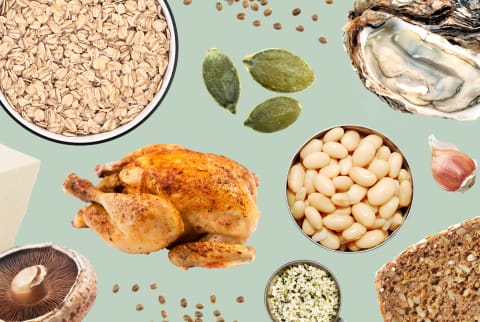11 Best Zinc-Rich Foods, According To RDs



Zinc is a mineral that plays a critical role in human health, but unfortunately our bodies don't produce it naturally. Along with wound healing, protein synthesis, and sensory maintenance1, zinc has been shown to support proper immune functioning by activating T-lymphocytes2, which attack infected cells.
Zinc's role in immune functioning3 may explain why many lozenges and supplements contain the mineral, registered dietitian and food blogger Maggie Michalczyk, R.D., says. While those are great options to up your zinc intake, there are also plenty of zinc-rich foods to help meet your basic needs.
Advertisement
The recommended daily intake of zinc4 is 11 milligrams for men and 8 milligrams for women. To make sure you're meeting those requirements, the National Institutes of Health (NIH) and registered dietitians suggest adding the below zinc-rich foods to your diet. (Note: The vitamin and mineral contents of foods vary, so the values shared below are estimates based on the USDA Database.)
Oysters
Zinc: 673% DV
Oysters are the highest source of zinc from food. In fact, just 3 ounces of cooked or breaded and fried oysters provides 74 milligrams or 673% of your daily value (DV).
If you don't live near the sea, registered dietitian Jess Cording, M.S., R.D., CDN, recommends eating canned oysters for the same benefits.
Crab and lobster
Zinc: 59% DV
Similar to other shellfish, crab and lobster are rich in omega-3 fatty acids and vitamin B, and are high in zinc. Crab provides 59% of your daily volume and lobster provides 31%.
Crab and lobster are also two of the best seafood choices5 in terms of low mercury levels, according to the Food and Drug Administration (FDA).
Advertisement
Red meat
Zinc: 64% DV
Red meat includes both pork and beef, with beef containing more zinc (up to 64% of your DV).
If you are a meat-eater, consider opting for lean meat, which tends to be lower in cholesterol and saturated fats. Not only will you get a good source of zinc, but you'll also increase your protein intake.
Chicken
Zinc: 8% to 22% DV
Chicken is a good source of both zinc and protein. Dark meat chicken, specifically, contains higher levels of zinc, with 22% of your DV. Chicken breast is still a good source, though, with 8% DV.
"You can create a lot of different meals with a source of poultry," Michalczyk tells us, "so it's an easy way to add zinc to your diet."
Advertisement
Baked Beans
Zinc: 26% DV
Beans are an inexpensive source of nutrients, including protein, fiber, magnesium, and, of course, zinc. Of all the legumes, baked beans (including vegetarian baked beans) are the highest in zinc with 2.9 milligrams per half-cup, or 26% DV.
Hemp seeds
Zinc: 30% DV
"Hemp seeds are a good source of essential fatty acids in a plant-based diet," naturopathic doctor and dietitian Jaime Schehr, N.D., R.D., says. The tiny seeds are packed with essential nutrients6 like vitamin E, phosphorus, potassium, and calcium and are high in zinc.
Advertisement
Yogurt
Cashews
Zinc: 15% DV
Cashews contain nutritional properties like selenium, magnesium, iron, and phosphorus and are high in zinc. One ounce (about 18 cashews) provides 1.6 mg or 15% of your daily zinc needs.
They're also an excellent source of phytochemicals, plant-based proteins, healthy fats, and antioxidants, Schehr says.
Advertisement
Pumpkin seeds
Zinc: 20% DV
While other seeds, like hemp, chia, and flax, are also high in zinc, Cording primarily recommends pumpkin seeds. Just 1 ounce provides 20% of your DV of zinc or 2.2 mg, but the nutrition benefits don't stop there. They're also loaded with magnesium to enhance sleep quality and antioxidants to fight free radicals—further supporting immunity.
Chickpeas
Zinc: 12% DV
Chickpeas may not be as high in zinc as baked beans, but they still provide 12% of your DV. The versatile beans are a good source of plant-based protein, fiber, phosphorus, and iron.
Whole grains
Zinc: 10% DV
"Many whole grains like quinoa, oats, and rice contain zinc and other vitamins and minerals like vitamin B, fiber, magnesium, and iron," Michalczyk says. One packet of plain oatmeal, for example, contains 10% of your DV.
While still a good source, Michalczyk says whole grains contain phytic acid, which may reduce the absorption of zinc7. Soaking grains and beans overnight will help reduce phytic acid and enhance mineral absorption. Combining these with other sources of zinc is a good way to make sure you're getting the right amount.

Abby Moore is an editorial operations manager at mindbodygreen. She earned a B.A. in Journalism from The University of Texas at Austin and has previously written for Tribeza magazine. She has covered topics ranging from regenerative agriculture to celebrity entrepreneurship. Moore worked on the copywriting and marketing team at Siete Family Foods before moving to New York.
7 Sources
- https://www.ncbi.nlm.nih.gov/pubmed/6349457
- https://www.ncbi.nlm.nih.gov/pubmed/20201035
- https://www.ncbi.nlm.nih.gov/pubmed/9701160
- https://ods.od.nih.gov/factsheets/Zinc-HealthProfessional/#en2
- https://www.fda.gov/food/consumers/advice-about-eating-fish
- https://www.ncbi.nlm.nih.gov/pmc/articles/PMC2868018/
- https://www.bmj.com/content/353/bmj.i2716/rr-3